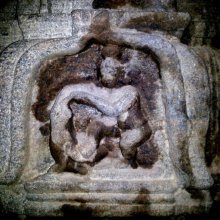Kamsa, Kaṃsa, Kaṃsā, Kamsha, Kaṃśa: 31 definitions
Introduction:
Kamsa means something in Buddhism, Pali, Hinduism, Sanskrit, Marathi, Jainism, Prakrit, Hindi. If you want to know the exact meaning, history, etymology or English translation of this term then check out the descriptions on this page. Add your comment or reference to a book if you want to contribute to this summary article.
Kamsa has 29 English definitions available.
The Sanskrit term Kaṃśa can be transliterated into English as Kamsa or Kamsha, using the IAST transliteration scheme (?).
Images (photo gallery)
Languages of India and abroad
Sanskrit dictionary
[Deutsch Wörterbuch]
Source: Cologne Digital Sanskrit Dictionaries: Böhtlingk and Roth Grosses Petersburger WörterbuchKaṃśa (कंश):—m. n. = kaṃsa [Amarakoṣa 2, 9, 32,] [Scholiast]
--- OR ---
Kaṃsa (कंस):—
--- OR ---
Kāṃsa (कांस):—
1) adj. aus Kaṃsa (fehlt als Name einer Localität u. kaṃsa) gebürtig gaṇa takṣaśilādi zu [Pāṇini’s acht Bücher 4, 3, 93.] —
2) m. n. [Siddhāntakaumudī.249,b,7.]
--- OR ---
Kaṃsa (कंस):—
2) m. = āḍhaka, bhājana, droṇa, kumbha, ghaṭa, armaṇa [Oxforder Handschriften 307,b,9.] [Śārṅgadhara SAṂH.1,1,20.] —
4) duḥsvapna [Oxforder Handschriften 27,a,18.] yajña [19.] hanana [23.] —
6) kaṃsa Nomen proprium einer Oertlichkeit gaṇa takṣaśilādi zu [Pāṇini’s acht Bücher 4, 3, 93.] — Vgl. kāṃsa, kāṃsya .
Source: Cologne Digital Sanskrit Dictionaries: Sanskrit-Wörterbuch in kürzerer FassungKaṃsa (कंस):——
1) m. (*n.) ein metallenes Gefäss , — Becher. —
2) m. *n. ein best. Hohlmaass , = āḍhaka , = zwei āḍhaka [Carakasaṃhitā 7,12.] —
3) m. n. Messing , Glockengut. sthāla n. [Lāṭyāyana’s Śrautasūtra 8,11,25.] —
4) m. Nomen proprium eines von Kṛṣṇa erschlagenen Fürsten von Mathurā [241,3.] —
5) Nomen proprium einer Oertlichkeit. —
6) f. ā Nomen proprium einer Schwester Kaṃsa's.
--- OR ---
Kāṃsa (कांस):—Adj. aus Kaṃsa gebürtig.
Sanskrit, also spelled संस्कृतम् (saṃskṛtam), is an ancient language of India commonly seen as the grandmother of the Indo-European language family (even English!). Closely allied with Prakrit and Pali, Sanskrit is more exhaustive in both grammar and terms and has the most extensive collection of literature in the world, greatly surpassing its sister-languages Greek and Latin.
See also (Relevant definitions)
Starts with (+48): Kamsabe, Kamsabhoga, Kamsadhvamsana, Kamsadoha, Kamsadvish, Kamsahan, Kamsahanana, Kamsajit, Kamsaka, Kamsakara, Kamsakeshinishudana, Kamsakrish, Kamsakrisha, Kamsakuta, Kamsala, Kamsalagitti, Kamsalaka, Kamsalanem, Kamsalavata, Kamsale.
Ends with (+3): Adhikamsha, Adhyardhakamsa, Anekamsa, Apaniyakamsa, Arkamsha, Avakamsa, Ayahkamsa, Ayaskamsa, Bhaktakamsa, Dvikamsa, Ekamsa, Karakamsha, Kshitikamta, Kulakamsa, Maha Kamsa, Malakamsa, Payahkamsa, Payaskamsa, Purnakamsa, Sukkamsa.
Full-text (+266): Kamsavati, Kamsasthi, Kamsika, Canura, Kamsavadha, Adhyardhakamsa, Kamsajit, Kamsya, Kamsakara, Kamsarati, Kamsahanana, Kamsahan, Kalankura, Mulabhadra, Bhojadhipa, Ardhakamsika, Putana, Mayavat, Kamsari, Kamsapatri.
Relevant text
Search found 70 books and stories containing Kamsa, Kaṃsa, Kaṃsā, Kamsha, Kaṃśa, Kaṃśā, Kāṃsa, Kāṃsā, Kāmsa; (plurals include: Kamsas, Kaṃsas, Kaṃsās, Kamshas, Kaṃśas, Kaṃśās, Kāṃsas, Kāṃsās, Kāmsas). You can also click to the full overview containing English textual excerpts. Below are direct links for the most relevant articles:
Garga Samhita (English) (by Danavir Goswami)
Verse 1.6.28 < [Chapter 6 - Description of Kaṃsa’s Strength]
Verse 2.23.15 < [Chapter 23 - The Killing of Śaṅkhacūḍa During the Rāsa-dance Pastime]
Verse 1.9.19 < [Chapter 9 - Description of Vasudeva’s Wedding]
Brihad Bhagavatamrita (commentary) (by Śrī Śrīmad Bhaktivedānta Nārāyana Gosvāmī Mahārāja)
Verse 2.4.103 < [Chapter 4 - Vaikuṇṭha (the spiritual world)]
Verse 1.7.30 < [Chapter 7 - Pūrṇa (pinnacle of excellent devotees)]
Verse 1.7.72-73 < [Chapter 7 - Pūrṇa (pinnacle of excellent devotees)]
Vasudevavijaya of Vasudeva (Study) (by Sajitha. A)
Kāraka (c): Karman < [Chapter 3 - Vāsudevavijaya—A Grammatical Study]
Poetic charm in Vāsudevavijaya < [Chapter 4 - Vāsudevavijaya—A Literary Appreciation]
Theme of the Vāsudevavijaya < [Chapter 2 - Vāsudevavijaya—Authorship and Content Analysis]
Sahitya-kaumudi by Baladeva Vidyabhushana (by Gaurapada Dāsa)
Text 4.18 < [Chapter 4 - First-rate Poetry]
Text 7.40 < [Chapter 7 - Literary Faults]
Text 10.262 < [Chapter 10 - Ornaments of Meaning]
Gobhila-grihya-sutra (by Hermann Oldenberg)
Vakyapadiya of Bhartrihari (by K. A. Subramania Iyer)
Verse 3.14.570 < [Book 3 - Pada-kāṇḍa (14): Vṛtti-samuddeśa (On Ccomplex Formation)]
Verse 3.7.5 < [Book 3 - Pada-kāṇḍa (7): Sādhana-samuddeśa (On the Means)]
Related products


